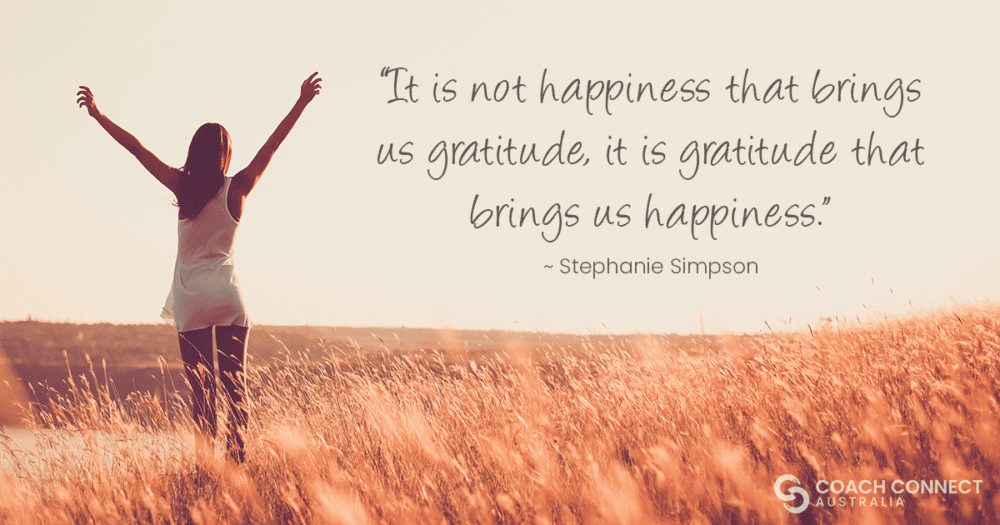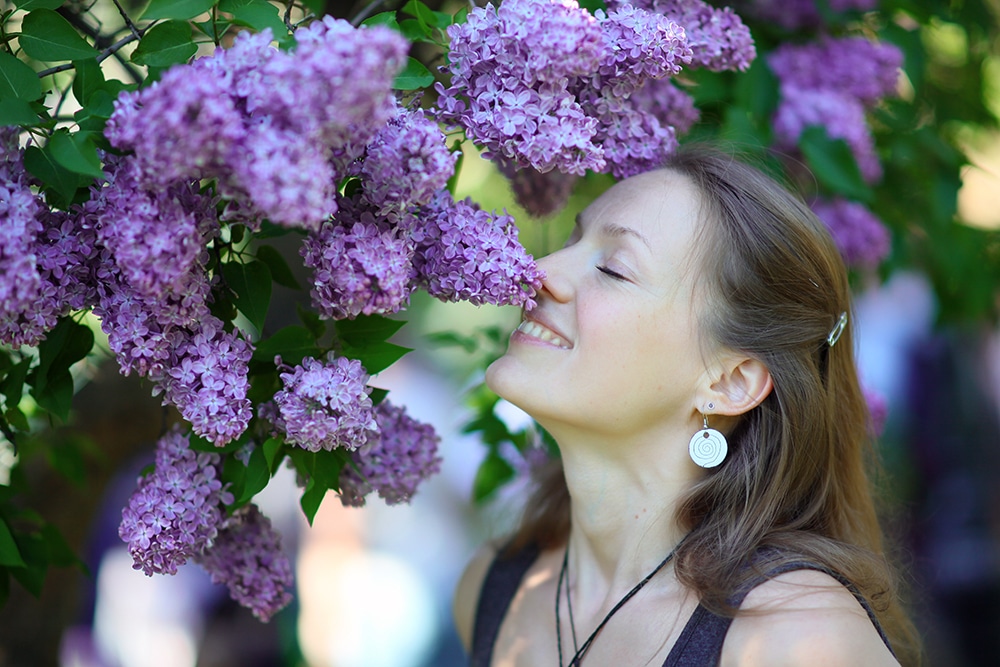- Article
- prev
- next
- Bookmark Article
- Share Article
- prev
- next
Attribution Details
Article: 5 Ways to Practice Gratitude and Boost Your Happiness
Written By: Libby Hogan, Coach Connect Australia
Article Content
Why is gratitude so powerful?
When you start practising gratitude regularly, your perspective on the world can change for the better. You start to focus less on what you don't have and more on what you do. You will begin to feel grateful for all the wonderful things in your life, and as a result, vastly improve your mental health, and feel more content and happy.
You build your capacity for gratitude much the same as you would build your strength at the gym. Achieving these types of gains isn't complicated, it just takes practice, consistency and a few handy tips to point you in the right direction...
There are so many ways to express gratitude for the people and world around you. If you're not sure where to begin, we're happy to help you get started!
What It Means To Practice Gratitude
The act of practicing gratitude is simply expressing your appreciation for things, situations or people in your life and acknowledging how they make you feel. This can be inspired by a loved one's support, success in your work or everyday life, or just feeling grateful for the simple things, like enjoying the warm sun on your face.
An important misconception to dispel is that gratitude practice is about being thankful for only the positive things in your life. True gratitude practice is looking for the positive in all things; finding the silver lining to be thankful for, even in the most negative of situations.
For example, a challenging, stressful time at work. We obviously won't feel grateful for the stress, but we can express our appreciation for the lessons learned from that situation that will serve us in the future.
There are several ways to practice gratitude and no option is better than another, it's just what works for you. The only key is to make a habit out of it.

The benefits of gratitude for your physical & mental health
When you begin practicing gratitude daily, you'll start to experience the many advantages that come with it. Here are just some of the benefits being grateful can have on your physical and mental health, as well as your relationships, well-being, life satisfaction and more.
Freedom from toxic emotions
Studies have found that recognising the positive aspects of your life can help free you from negative emotions. This is due to the well-researched link between gratitude and overall wellbeing.
Gratitude can improve psychological health, making us less likely to experience toxic emotions such as envy, regret, frustration, and resentment. Leaving much more room for you to experience more positive emotions like happiness, excitement, joy, hope, and inspiration. It just makes sense why grateful people generally have so much more happiness in their lives.
“It is not happiness that brings us gratitude, it is gratitude that brings us happiness.” ~ Stephanie Simpson

A boost in self-esteem
One positive psychology study published in the Journal of Applied Sport Psychology noted that being grateful had a positive impact on the self-esteem of athletes. It helped them reduce social comparisons and see the value in their abilities and accomplishments.
This obviously also resulted in significantly better mental health and well-being. Something people of all walks of life can benefit from.
Strengthened relationships
Expressing gratefulness to your friends, family, and coworkers and communicating how much you appreciate them can easily strengthen those relationships. This approach can also help open the door to new connections and opportunities which is always a bonus both professionally and personally.
Everyone wants to feel valued and appreciated. As such, thankful appreciation can go a long way in developing deeper relationships.

Improved sleep quality
Another positive psychology study published in the Journal of Psychosomatic Research found that gratitude helped people sleep longer and better.
Positive thoughts can influence our brain chemistry. It can help to decrease cortisol (a stress hormone) as well as elevate our levels of serotonin; a hormone that enables us to feel calmer, happier and have better emotional regulation. So, when our serotonin levels are normal, in addition to improved mental health, it naturally makes it much easier to get to sleep at night.
Pain reduction, immunity and heart health
Gratitude practice has been shown to have a huge effect on not only your mental health but also on your physical health too. Being grateful and having a positive attitude have been shown to help alleviate pain, improve your tolerance to chronic pain, and even help people to heal faster.
Furthermore, as mentioned above, it helps to reduce stress hormones. As you may already know, stress lowers the immune response, whereas increased mental health and well-being can help your body fight off illnesses.
One of the many other great benefits of being grateful is also a reduced risk of heart disease by lowering blood pressure and even aiding in stabilising blood sugar levels in patients predisposed to heart disease. A grateful person is generally a happier person with more energy, predisposing them to be more inclined to stay active and lead a healthy lifestyle.
Decreased anxiety and depression
While clinical anxiety and depression require a holistic approach, gratitude practice has been shown to be an effective tool in helping to reduce symptoms.
Again, by cultivating feelings of gratitude we can reduce stress hormone levels and at the same time, increase serotonin, dopamine and oxytocin - the brain neurotransmitters that make us feel good.
How to start practicing gratitude and enjoy the benefits of more positive emotions
This doesn't have to be time-consuming or overly complex. You can begin right now at this very moment. If you're not sure where to start, here are a few methods to consider:
1. Gratitude journaling
You don't have to spend a lot of time on this and what you write about doesn't always have to be big and profound. It could be as simple as expressing appreciation for the yummy dessert you had after dinner.
To make things as simple as possible, there are specific gratitude journaling books you can buy that come with prompts. A quick Google Shopping search will provide some great results.
Or, if you want a blank canvas but would still like a few prompts to help you get going, here are some handy links with gratitude journaling prompts:
- 50 Daily gratitude journal prompts to help you notice the good in your life
- 40 Refreshing gratitude journal Prompts - fantastic if you want to get the kids involved too!
- Free Gratitude Prompts for Increased Wellbeing
I suggest keeping a list of questions somewhere handy for you to refer to, and the more the better. If you can mix things up each time and keep the questions fresh, you're more likely to stick with it.

2. Alternative if you don't like gratitude journaling
If starting a gratitude journal isn't your thing, here's an easy alternative that's just as effective. Grab your partner, kids, family member, or friend and choose a few prompts/questions for each person to answer. You can simply discuss them rather than writing them down.
Not only is this a great way to feel grateful, but it's a lovely way to spend quality time with loved ones. Plus, it can make for some very interesting conversations! You can do it over dinner, over coffee, before bed, whatever works for you.
3. Meditating
Meditation in itself is a wonderful method of reducing negative emotions, improving your mental health and supporting your well-being. So, incorporating gratefulness into meditation can be very powerful.
If you're an experienced meditator, you shouldn't have any issues choosing a topic to focus on. If you're a novice though, guided meditations are the way to go and there are plenty of them that are freely available on platforms such as Youtube. Like the following, for example, it's only 5-minutes long so very easy to do:
4. Sharing your gratitude with others
Research has shown that when we experience gratitude, one of the hormones released by the brain is oxytocin, which plays an important role in social bonding. It's the same hormone mothers release after birth to facilitate bonding with the baby.
So the next time your partner, friend, family member or co-worker does something you appreciate, be sure to let them know.
Again, it doesn't have to be complicated. A simple thank you for "..." will suffice. Or, doing something thoughtful to show a loved one how much you value them. You could write a thank-you note, email or quick gratitude letter expressing what you value about that person, why you appreciate them and the ways they have inspired you.
The point is to be intentional and actually communicate your appreciation. Sometimes it's easy to think about someone or something they have done that we feel grateful for but not say anything. Each time we don't is a missed opportunity to experience warm fuzzies. It feels good to be appreciated, and it feels good to make someone else happy; it's a win-win.
5. Mindfulness
This is all about taking a moment (which you can do anywhere and at any time) to stop, pause and simply take notice of the present moment.
Life can be so busy that we can completely miss a multitude of things to be grateful for. Stop and take the time to enjoy the little things; watch a sunset, enjoy the view, smell the flowers, feel the warmth from a cosy fire, the taste of a freshly made coffee... you get my drift.
You can even use past experiences to guide this. For example, I remember after returning from a trip to China how much I had previously taken for granted the clear, fogless skies I enjoy at home and being able to turn on a water tap and drink straight from it. There is an abundance of things like that to feel grateful for.
If you struggle to find and focus on something, employing your senses is a good way to start. Just think about what you can see, hear, touch, taste and/or smell and let your senses guide you towards something good.

Remember To Manage Your Expectations
No one can change their perspective or establish new habits overnight. An important aspect of practising gratitude, and personal development in general, is to remember to manage your expectations.
It's great to be excited about the benefits of gratitude coming your way, but try to be kind and patient with yourself.
You need to maintain your optimism while also being practical about how to turn this practice into a habit. A good way of doing this is to choose methods that are well suited to you and your lifestyle. If you love sleeping in, for example, don't force yourself to wake up early to meditate. Consider doing it before bed instead.
Furthermore, don't let setbacks deter you from starting again. Life can get busy. If you get out of the habit for a while, don't put a guilt trip on yourself; it's ok!
Every passing moment is an opportunity to feel grateful. So, if you miss one that's fine because another one will come.
Prioritise Your Personal Development
Once you make gratitude a habit, you may start noticing meaningful changes in how you sleep, see the world, and interact with others. Simple acts like writing in a gratitude journal and meditating can do wonders for your mental health, well-being, and your ability to strengthen relationships.
So, why not take things a step further by connecting with an experienced life coach, or health and wellbeing coach?
A professional coach can offer motivation, insight, and suggestions that help you improve your life and/or business and help you enjoy the tremendous benefits of gratitude. At Coach Connect Australia, our purpose is to help connect you with the right coach for your needs and goals. You can:
- Browse the directory to find a coach
- Use the Connect Me Service to have one of our coaches get in touch with you
- Fill out our contact form to speak with us directly. We'd be happy to help you connect with a coach or answer any questions you may have.
Good luck on your gratitude journey and if you have any of your own ideas for practising gratitude, I'm sure our community would love to know. Drop a comment below and share your best tip!

Disclaimer: Coach Connect Australia is not responsible for the content published by our contributing authors. The views, thoughts, and opinions expressed in this article belong solely to the article author. The content is designed to support, not replace any kind of professional or medical treatment.
Meet the Author:
Explore More Categories:
- ADHD Coaching
- Anxiety Coaching
- Autism Coaching
- Business Coaching
- Career Coaching
- Confidence & Mindset Coaching
- Executive & Leadership Coaching
- Finance & Wealth Coaching
- Grief & Trauma Coaching
- Health & Wellbeing Coaching
- Life Coaching & Personal Development
- Marketing & Sales Coaching
- Parenting & Family Coaching
- Relationship Coaching
- Separation & Divorce Coaching






